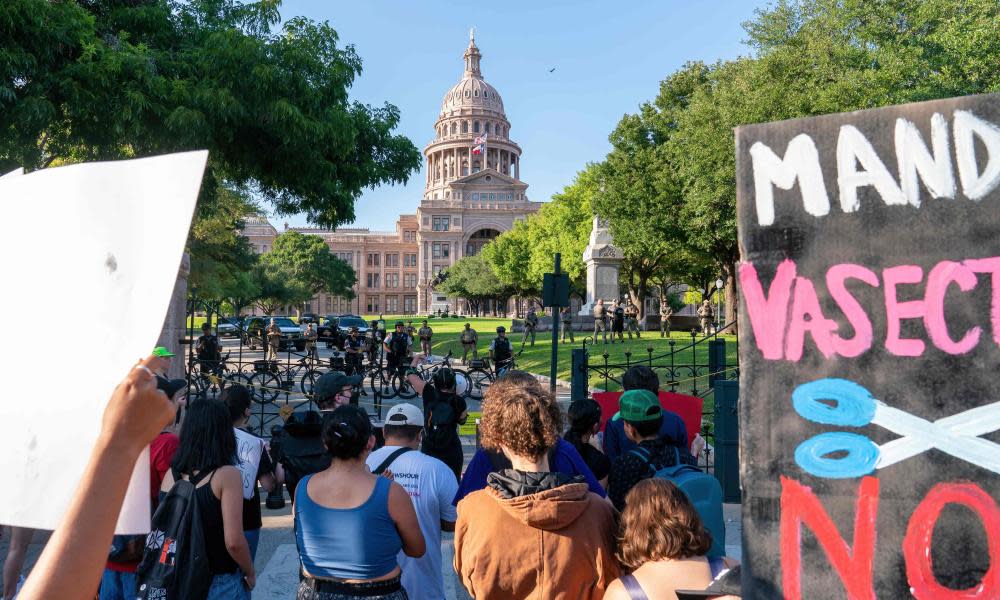Democratic cities in Texas push to blunt impact of state’s abortion ban

Across Texas, Democratic-held cities are galvanizing to mitigate the effects of the Republican-run state’s near-total abortion ban after the US supreme court voted in June to overturn Roe v Wade, the landmark case that gave Americans a constitutional right to terminate their pregnancies.
Texas’s capital, Austin, voted last week to “decriminalize” abortion in the city by passing the Guarding the Right to Abortion Care for Everyone (Grace) Act. Although abortion is still illegal in the state, the passing of the Grace Act will redirect the city’s budget to focus on going after more important crimes such as sexual assault, theft and burglary.
Related: Sharp rise in US abortion clinic closures after Roe v Wade overturned
Local politicians in Waco, a city halfway between Austin and Dallas, followed suit and put forward their own version of the Grace Act for consideration.
Other cities such as San Antonio are also gearing up to protect those who receive and provide abortions. On Wednesday, the mayor, Ron Nirenberg, and the city council gathered on the steps of city hall to announce the consideration of a similar resolution in support of reproductive rights.
City council member Teri Castillo, who drafted a resolution, told the Guardian: “The community and the constituency of San Antonio aren’t ready to take us back in history, and that’s why I joined those residents who took it to the streets to protest the overturning of Roe v Wade.”
She said: “What we’re seeking to do is to let folks know that the fight starts locally, and that we do have an authority as a city council to ask and give the policy recommendation that city funds will not be used to store or catalog any report of an abortion, miscarriage or other reproductive healthcare acts strictly for the purpose of pursuing a criminal investigation.”
Castillo said she anticipates the Republican party will identify ways to close potential loopholes or protections for those who wish or need to seek access to an abortion.
According to Cynthia Alkon, a Texas A&M law professor, Castillo is right to worry. Alkon underscored that de-prioritizing the criminalization of abortion is not the same thing as decriminalizing abortion.
“If the attorney general in Texas is really hellbent on prosecuting abortion-related cases as crimes in counties where the local district attorney is rightfully exercising their discretionary authority and deciding not to, I think they’re kind of left with two choices: they either try and get appointed as attorney pro tem [for the time being] or, they change the laws of what the attorney general can do.”
Liberal cities face an uphill battle, with several obstacles along the way, including Texas’s hardline attorney general, Ken Paxton, who has indicated he will pursue prosecution.
In Fort Worth’s Tarrant county, district attorney Sharen Wilson said she will prosecute abortion cases, but in nearby Dallas county, her counterpart, John Creuzot, has said he will not stand in the way of anyone seeking healthcare.
Kim Ogg, district attorney of Harris county, the largest county in Houston, said she will consider prosecution in the event of an abortion on a case-by-case basis, but said: “The criminalization of reproductive health will cause great harm to women in America; prosecutors and police have no role in matters between doctors and patients.”
Additionally, the commissioner’s court of Harris county, voted 3-2 in favor of Texans’ access to abortion and contraception.
The so-called “heartbeat law”, which bans abortion around six weeks – when a cardiac activity is detected – is already in effect in the state. Texas’s “trigger law”, which will classify abortion as a felony, even in the case of rape or incest, goes into effect on 25 August.

